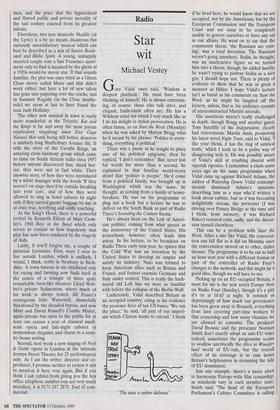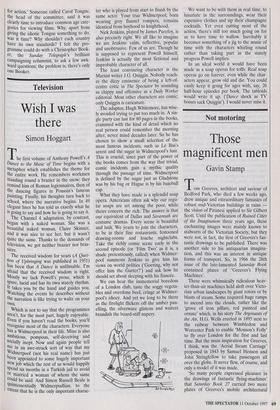Radio
Star wit
Michael Vestey
Gore Vidal once said, 'Wisdom is deepest platitude.' He must have been thinking of himself. He is always entertain- ing, of course; those who talk utter, and elegant, balderdash often are. He has a Wildean cruel wit which I very much like as I do his delight in stylish provocation. He is often funny, as on Start the Week (Monday) when he was asked by Melvyn Bragg what he'd meant by his phrase: 'Politics is every- thing, everything is political.'
There was a pause as he sought to place one of his polished epigrams; then he replied, 'I don't remember.' But, never lost for words for more than a second, he explained in that familiar world-weary drawl that 'politics is people'. He'd come from a political family, was brought up in Washington which was the same, he thought, as coming from a family of house- breakers. He was on the programme to plug not a book but a lecture he was to deliver on the South Bank as part of Radio Three's Sounding the Century theme.
He's always been on the Left of Ameri- can politics, coming from what passes as the aristocracy of the United States. His iconoclasm, however, often leads him astray. In his lecture, to be broadcast on Radio Three early next year, he opines that the Cold War was an invention by the United States to develop its empire and satisfy its industry; Nato was formed to keep American allies such as Britain and France, and former enemies Germany and Italy under control. This is really the hack- neyed old Left line we were so familiar with before the collapse of the Berlin Wall.
Ludicrously, Vidal described Britain as an occupied country, citing as his evidence the presence here of ten US bases. 'We run the place,' he said, 'all part of our imperi- urn which Clinton wants to extend.' I think 'The taste is rather dubious' if he lived here, he would know that we are occupied, not by the Americans, but by the European Commission and the European Court and are soon to be completely unable to govern ourselves or have any say in our affairs. He went on to say that the communist threat, 'the Russians are com- ing', was a total invention. The Russians weren't going anywhere. Stalin, he thought, was an unattractive figure so we turned him into a threat, though, he added hastily, he wasn't trying to portray Stalin as a nice guy. I should hope not. There is plenty of evidence to show that he was as great a monster as Hitler. I hope Vidal's lecture isn't as banal as his comments on Start the Week, as he might be laughed off the lectern, unless, that is, his audience consists of unreconstructed Marxist anoraks.
His assertions weren't really challenged in depth, though Bragg and another guest, Tom Sutcliffe of the Independent, clearly had reservations. Martin Amis, promoting his latest novel Night Train, said to Vidal, 'I like your thesis, it has the ring of satirical truth,' which I took to be a polite way of disagreeing with it. He was possibly aware of Vidal's skill at crushing dissent with viperish ripostes. I remember a clash some years ago on the same programme when Vidal came up against Richard Adams, the author of Watership Down. Vidal contemp- tuously dismissed Adams's opinions, describing him as a man who'd written a book about rabbits. Just as it was becoming delightfully vicious, the presenter (I was driving over Putney Bridge at the time and I think, from memory, it was Richard Baker) restored calm, sadly, and the discus- sion turned elsewhere.
This can be a problem with Start the Week. After a star like Vidal, the conversa- tion can fall flat as it did on Monday once the conversation moved on to other, duller themes. The programme is to be cut to half an hour next year with a different format as part of the controller of Radio Four's changes to the network, and this might be a good idea, though we will have to see.
Picking up on an EU-occupied Britain, a must for me is the new series Europe Now on Radio Four (Sunday), though it's a pity it's on at 10.45 at night. It reminds us depressingly of how much our governance has been given away to Brussels, everything from laws covering part-time workers to film censorship and how many vitamins we are allowed to consume. The producer David Browne and the presenter Norman Smith don't exactly adopt an anti-EU tone; indeed, sometimes the programme seems to swallow uncritically the Alice in Wonder- land world of EU-rule, but the overall effect of its coverage is to ram home Britain's helplessness in stemming the tide of EU dominance.
Just one example: there's a move afoot to harmonise Europe-wide film censorship, as standards vary in each member state. Smith said, The head of the European Parliament's Culture Committee is calling for action.' Someone called Carol Tongue, the head of the committee, said it was Clearly time to introduce common age cate- gories for viewing films. Why, apart from giving the idiotic Tongue something to do, was it time? Why shouldn't each country have its own standards? I felt the pro- gramme could do with a Christopher Book- er, the Sunday Telegraph's brilliant campaigning columnist, to ask a few awk- ward questions; the problem is, there's only one Booker.



















































































 Previous page
Previous page